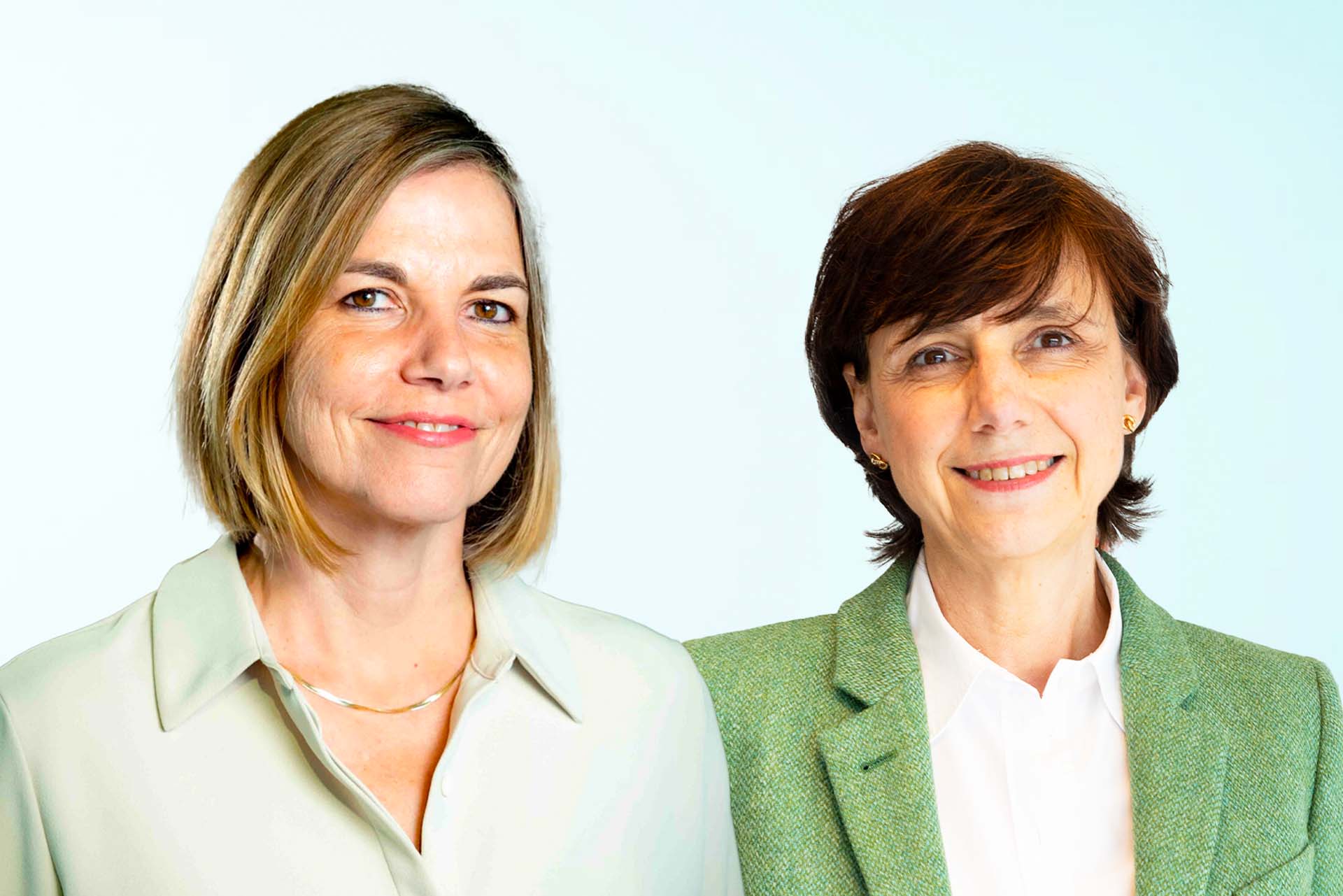This article was part of a series on ‘Biology meets Technology’ in the lead-up to Science for health 2023, where BioWin and MEDVIA are organizing partners. Header image: Ann Van Gysel (MEDVIA) and Sylvie Ponchaut (BioWin).
Q: Why did BioWin and MEDVIA decide to join forces for Science for health?
Sylvie Ponchaut (Managing Director of BioWin): “BioWin and MEDVIA are both clusters dedicated to promoting health innovation, and collaboration is in our DNA. By jointly organizing Science for health, we aim to consolidate a critical mass of players active in a specific health domain. The goal is to work together to facilitate the development of bridges between our two communities – between the governments, companies, research institutes, hospitals, and more. To foster collaboration, you have to develop trust between partners, and events like Science for health can be a good medium for this. For BioWin specifically, we are aiming for this event to offer opportunities for our Walloon members to network with the Flemish community to facilitate research and business collaborations and consolidate the sector. MEDVIA was naturally our first choice of partner for this.”
“BioWin and MEDVIA are both clusters dedicated to promoting health innovation, and collaboration is in our DNA.” – Sylvie Ponchaut
Ann Van Gysel (CEO of MEDVIA): “MEDVIA has a unique role to play in the Flemish healthtech ecosystem by bringing different stakeholders together and supporting our member’s journeys via grants and the MEDVIA academy. We also strive to bring about collaborations between different players, including Walloon entities, as we firmly believe that diversity fosters the creativity and out-of-the-box thinking we need for revolutionary progress in healthcare. With BioWin we have a strong ally – together, we can address challenges at the federal level, and align funding channels to make joint projects between Flemish and Walloon actors possible.
“Science for health is a great conference to help us build more bridges between our two regions, as it allows us to come together on a topic which is important for both our ecosystems. This year, the event will explore innovations at the interface of biology and technology, showcasing examples of novel treatment and prevention platforms, as well as the biopharma factories of the future. By attending the conference, innovators can expect to network and be inspired. We also aim to bring together all the relevant stakeholders in our ecosystems to discuss the current opportunities and challenges in the field. This will be the focus of our panel discussion, where we’ll be considering our roadmap for the future. Together, we need to seize this enormous opportunity to further develop Belgium’s vibrant knowledge economy and healthtech ecosystem, combining our strengths to provide both Flanders and Wallonia with leverage in the international arena.”
Q: Do Flanders and Wallonia differ in what they bring to the Belgian healthtech ecosystem?
Sylvie Ponchaut: “In Wallonia, we are specialized in the development of novel therapies, like cell and gene therapies and biologics. The industrial production processes for these medicinal products – cells, genes, antibodies, and recombinant proteins, etc. – are extraordinarily complex, and require further innovation. This is a strength for our biotech and pharma companies as well as our CDMOs [ed. Contract Development and Manufacturing Organizations]. With further innovation, we aim to bring the production costs down for these products and make the price of therapies feasible for payers. Walloon companies are employing nanotechnology, microfluidics, digitalization, and more to improve production processes. It is also an area where we see great complementarity between the regions, because Flanders has outstanding universities, research centers, and an SME landscape with a great pool of entrepreneurial talent which can help push progress to the next level. We could both benefit from collaborations between Flemish and Walloon entities to help consolidate this emerging value chain.”
“Tapping into each other’s strengths is key to creating products with true patient impact.” – Ann Van Gysel
Ann Van Gysel: “Indeed, Flanders has a great R&D hub, where hospitals are embracing innovation and working together with the universities and research institutes like SCK-CEN, VITO, imec, and VIB to drive innovation in healthcare. We embrace innovations at the crossroads of biotech, pharma, digital health, and devices, but this is a challenging domain, and one where we could certainly benefit from the complementary activities of the biopharma factory innovation taking place in the Walloon ecosystem. Tapping into each other’s strengths is key to creating products with true patient impact.”
Q: Are there any specific hurdles to cooperation between the Belgian regions?
Sylvie Ponchaut: “Currently, it remains very difficult to develop projects in Belgium involving both Flemish and Walloon entities. This is because research funding is the responsibility of the regional governments in Belgium, so projects involving entities from the north and south of the country have to convince two separate governments. That remains difficult, which is a pity. Most cross-border collaborations are currently specific initiatives involving private companies. We need to put more incentives and framework in place to facilitate the development of ambitious government-funded projects involving both communities. In the healthcare sector, it is especially important to be able to create critical masses of scientists. I hope that by participating in events like Science for Health, we will succeed in bridging some gaps and forcing the government to sit down and discuss common topics, enabling the development of cross-border collaborative innovation. The organization of research funding is currently too complex in Belgium, and I think it’s a part of BioWin and MEDVIA’s jobs to convince the regions that a more favorable context is really important for the healthtech ecosystem in the country.”
“The scientists and the entrepreneurs are very open to collaborating, but we need more support from the government to facilitate those connections.” – Ann Van Gysel
Ann Van Gysel: “Members of both BioWin and MEDVIA are very open to collaboration and want to create more connections. We have a strong ally in BioWin, and together we can address the challenges that play out at the federal level. We are trying to align funding channels, so that companies, hospitals, and universities in both regions can obtain the support they need to work together. It isn’t easy, but we have succeeded in creating a first joint call for projects, on the topic of ATMPs [ed. Advanced Therapy Medicinal Products], which is currently open. Collaboration is particularly important in the international context: the competition outside of Belgium is steep, so joint progress isn’t just a ‘nice to have’ for the two organizations – it’s mandatory. Joining forces allows us to build a stronger hub and attract more international investments, but we have to build that critical mass. The scientists and the entrepreneurs are very open to collaborating, but we need more support from the government to facilitate those connections.”
Q: What is your vision for the future of cross-regional cooperation in Belgium?
Ann Van Gysel: “The different regions should continue to build on their own strengths, and regional investments are key for this. Flanders and Wallonia are often complementary, so I want to see both regions continue to move forwards. Then, if we can join forces, 1+1 can become greater than 2. I also want Belgium to present a more cohesive front on the world stage. Internationalization is very important for MEDVIA, and we will soon be rolling out a series of workshops and trainings for our members on how to enter global markets. We’re doing this for both scale-ups and startups, because there is a lot of non-dilutive funding to be had in the US, for example. International investors also tend to be more knowledgeable and willing to invest in healthtech innovations, which have a completely different business model to biotech. So, looking beyond our borders can help kickstart Flemish and Walloon innovators. But we should be tackling the world together.”
Read this article to find out what tech pioneer Jan Rabaey thinks about the convergence of biology and technology!
Sylvie Ponchaut: “Currently, I think the lack of collaboration is leading to missed opportunities for both regions. But if we create more bridges between the Flemish and the Walloon communities, we will increase the quality of the science on both sides. Both regions can learn a lot from one another, and increased connections would lead to the development of new activities, publications, patents, partnerships, companies, and the consolidation of the sector. I would also expect a positive economic outcome in terms of job creation and increased valuation of the companies. Ultimately though, what I hope to see most is the societal impact – for jointly-developed drugs and medical devices to improve the health of patients in Belgium and the rest of the world.”
Interested in the topic of ‘Biology meets Technology’? Then join Ann Van Gysel and Sylvie Ponchaut in attending Science for health on 28 November 2023 in Brussels!



